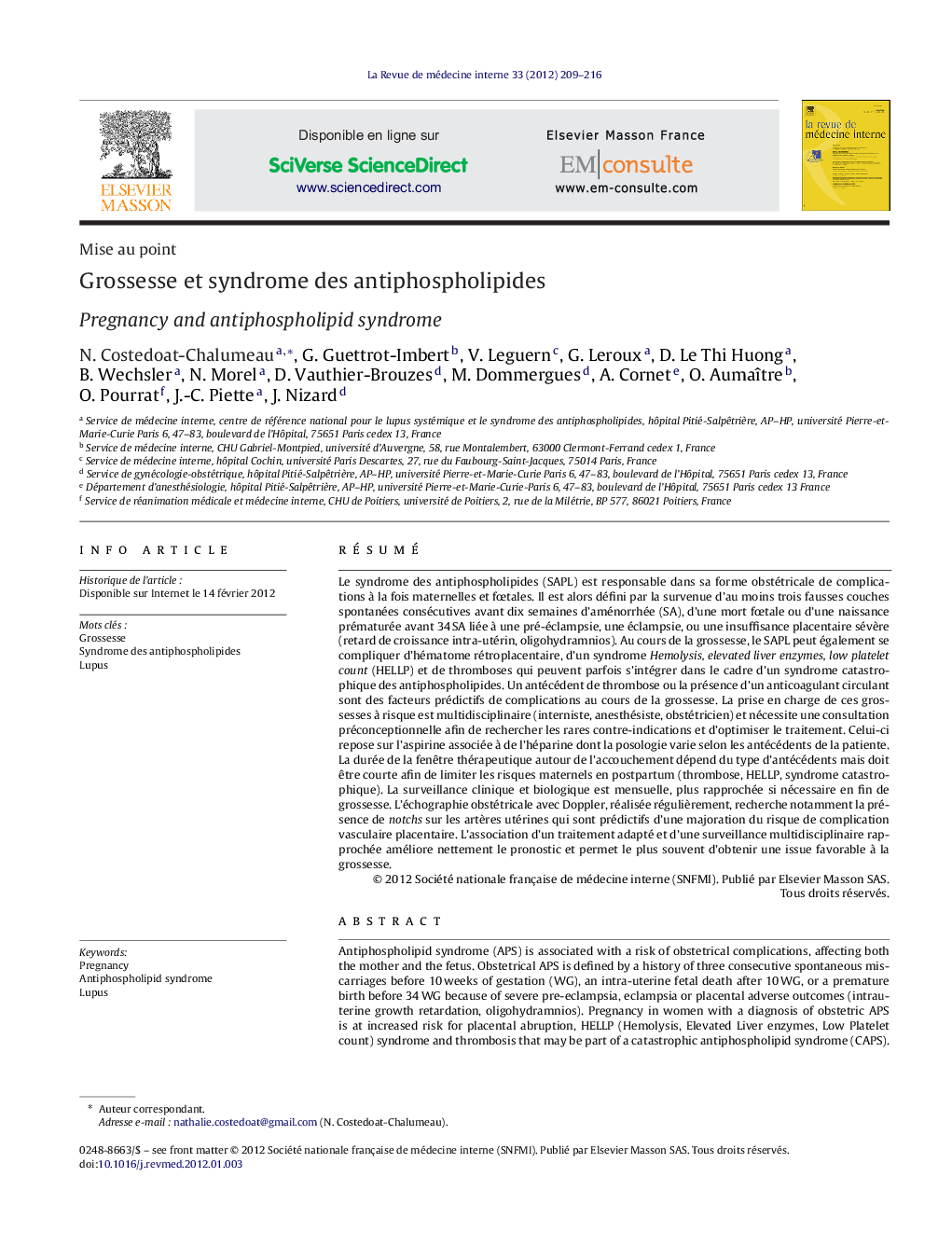| کد مقاله | کد نشریه | سال انتشار | مقاله انگلیسی | نسخه تمام متن |
|---|---|---|---|---|
| 3022938 | 1182425 | 2012 | 8 صفحه PDF | دانلود رایگان |

RésuméLe syndrome des antiphospholipides (SAPL) est responsable dans sa forme obstétricale de complications à la fois maternelles et fœtales. Il est alors défini par la survenue d’au moins trois fausses couches spontanées consécutives avant dix semaines d’aménorrhée (SA), d’une mort fœtale ou d’une naissance prématurée avant 34 SA liée à une pré-éclampsie, une éclampsie, ou une insuffisance placentaire sévère (retard de croissance intra-utérin, oligohydramnios). Au cours de la grossesse, le SAPL peut également se compliquer d’hématome rétroplacentaire, d’un syndrome Hemolysis, elevated liver enzymes, low platelet count (HELLP) et de thromboses qui peuvent parfois s’intégrer dans le cadre d’un syndrome catastrophique des antiphospholipides. Un antécédent de thrombose ou la présence d’un anticoagulant circulant sont des facteurs prédictifs de complications au cours de la grossesse. La prise en charge de ces grossesses à risque est multidisciplinaire (interniste, anesthésiste, obstétricien) et nécessite une consultation préconceptionnelle afin de rechercher les rares contre-indications et d’optimiser le traitement. Celui-ci repose sur l’aspirine associée à de l’héparine dont la posologie varie selon les antécédents de la patiente. La durée de la fenêtre thérapeutique autour de l’accouchement dépend du type d’antécédents mais doit être courte afin de limiter les risques maternels en postpartum (thrombose, HELLP, syndrome catastrophique). La surveillance clinique et biologique est mensuelle, plus rapprochée si nécessaire en fin de grossesse. L’échographie obstétricale avec Doppler, réalisée régulièrement, recherche notamment la présence de notchs sur les artères utérines qui sont prédictifs d’une majoration du risque de complication vasculaire placentaire. L’association d’un traitement adapté et d’une surveillance multidisciplinaire rapprochée améliore nettement le pronostic et permet le plus souvent d’obtenir une issue favorable à la grossesse.
Antiphospholipid syndrome (APS) is associated with a risk of obstetrical complications, affecting both the mother and the fetus. Obstetrical APS is defined by a history of three consecutive spontaneous miscarriages before 10 weeks of gestation (WG), an intra-uterine fetal death after 10 WG, or a premature birth before 34 WG because of severe pre-eclampsia, eclampsia or placental adverse outcomes (intrauterine growth retardation, oligohydramnios). Pregnancy in women with a diagnosis of obstetric APS is at increased risk for placental abruption, HELLP (Hemolysis, Elevated Liver enzymes, Low Platelet count) syndrome and thrombosis that may be part of a catastrophic antiphospholipid syndrome (CAPS). A previous thrombosis and the presence of a lupus anticoagulant are risk factors for pregnancy failure. A multidisciplinary approach, associating the internist, the anesthesiologist and the obstetrician, is recommended for these high-risk pregnancies. Preconception counseling is proposed to identify pregnancy contraindications, and to define and adapt the treatment prior and during the upcoming pregnancy. Heparin and low-dose aspirin are the main treatments. The choice between therapeutic or prophylactic doses of heparin will depend on the patient's medical history. The anticoagulant therapeutic window for delivery should be as narrow as possible and adapted to maternal thrombotic risk. There is a persistent maternal risk in the postpartum period (thrombosis, HELLP syndrome, CAPS) justifying an antithrombotic coverage during this period. We suggest a monthly clinical and biological monitoring which can be more frequent towards the end of pregnancy. The persistence of notches at the Doppler-ultrasound evaluation seems to be the best predictor for a higher risk of placental vascular complications. Treatment optimization and multidisciplinary antenatal care improve the prognosis of pregnancies in women with obstetric APS, leading to a favorable outcome most of the time.
Journal: La Revue de Médecine Interne - Volume 33, Issue 4, April 2012, Pages 209–216